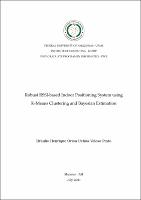| ???jsp.display-item.social.title??? |


|
Please use this identifier to cite or link to this item:
https://tede.ufam.edu.br/handle/tede/8374Full metadata record
| DC Field | Value | Language |
|---|---|---|
| dc.creator | Pinto, Bráulio Henrique Orion Uchôa Veloso | - |
| dc.creator.Lattes | http://lattes.cnpq.br/2044598311458637 | por |
| dc.contributor.advisor1 | Oliveira, Horácio Antonio Braga Fernandes de | - |
| dc.contributor.advisor1Lattes | http://lattes.cnpq.br/9314744999783676 | por |
| dc.contributor.referee1 | Pazzi, Richard Werner | - |
| dc.contributor.referee1Lattes | * | por |
| dc.contributor.referee2 | Barreto, Raimundo da Silva | - |
| dc.contributor.referee2Lattes | http://lattes.cnpq.br/1132672107627968 | por |
| dc.date.issued | 2021-07-22 | - |
| dc.identifier.citation | PINTO, Bráulio Henrique Orion Uchôa Veloso. Robust RSSI-based indoor positioning system using k-means clustering and Bayesian estimation. 2021. 40 f. Dissertação (Mestrado em Informática) - Universidade Federal do Amazonas, Manaus, 2021. | por |
| dc.identifier.uri | https://tede.ufam.edu.br/handle/tede/8374 | - |
| dc.description.resumo | This work proposes a new indoor positioning system, named KLIP, that uses the K-means clustering algorithm to split the environment into different sets of log-distance propagation models in order to better characterize the indoor environment and further improve the position estimation using Bayesian inference. The proposed method is validated in a large-scale, real-world scenario composed of Bluetooth Low Energy (BLE)-based devices. It is demonstrated, throughout the work, that the addition of location information of training points to the received signal strength indicator (RSSI) as an attribute for the clustering step improves the positioning accuracy. Moreover, the obtained results show that the solution outperforms the naive Bayesian estimation up to 12% – regarding the positioning accuracy – and the broadly deployed kNN for reduced training dataset size – regarding both accuracy and online processing time. In this sense, KLIP proves to be an efficient and scalable alternative when both site-survey effort and energy consumption constraints must be taken into account. | por |
| dc.description.abstract | This work proposes a new indoor positioning system, named KLIP, that uses the K-means clustering algorithm to split the environment into different sets of log-distance propagation models in order to better characterize the indoor environment and further improve the position estimation using Bayesian inference. The proposed method is validated in a large-scale, real-world scenario composed of Bluetooth Low Energy (BLE)-based devices. It is demonstrated, throughout the work, that the addition of location information of training points to the received signal strength indicator (RSSI) as an attribute for the clustering step improves the positioning accuracy. Moreover, the obtained results show that the solution outperforms the naive Bayesian estimation up to 12% – regarding the positioning accuracy – and the broadly deployed kNN for reduced training dataset size – regarding both accuracy and online processing time. In this sense, KLIP proves to be an efficient and scalable alternative when both site-survey effort and energy consumption constraints must be taken into account. | eng |
| dc.description.sponsorship | FAPEAM - Fundação de Amparo à Pesquisa do Estado do Amazonas | por |
| dc.description.sponsorship | CAPES - Coordenação de Aperfeiçoamento de Pessoal de Nível Superior | por |
| dc.format | application/pdf | * |
| dc.thumbnail.url | https://tede.ufam.edu.br//retrieve/47683/Disserta%c3%a7%c3%a3o_BraulioHenrique_PPGI.pdf.jpg | * |
| dc.language | eng | por |
| dc.publisher | Universidade Federal do Amazonas | por |
| dc.publisher.department | Instituto de Computação | por |
| dc.publisher.country | Brasil | por |
| dc.publisher.initials | UFAM | por |
| dc.publisher.program | Programa de Pós-graduação em Informática | por |
| dc.rights | Acesso Aberto | por |
| dc.subject | Sistema de posicionamento interno | por |
| dc.subject | Inferência bayesiana | por |
| dc.subject | Bluetooth Low Energy | eng |
| dc.subject | Sistema KLIP | por |
| dc.subject | Banco de dados de impressão digital | por |
| dc.subject.cnpq | CIÊNCIAS EXATAS E DA TERRA | por |
| dc.title | Robust RSSI-based Indoor Positioning System using K-means Clustering and Bayesian Estimation | por |
| dc.title.alternative | Sistema Robusto de Localização Interna usando Agrupamento K-means e Estimativa Bayesiana | por |
| dc.type | Dissertação | por |
| dc.creator.orcid | https://orcid.org/0000-0001-8885-5609 | por |
| dc.contributor.referee1orcid | https://orcid.org/0000-0003-4308-6265 | por |
| dc.subject.user | Bayesian estimation | eng |
| dc.subject.user | Indoor positioning | eng |
| dc.subject.user | K-means clustering | eng |
| dc.subject.user | Log-distance path loss model | eng |
| dc.subject.user | Rssi | eng |
| Appears in Collections: | Mestrado em Informática | |
Files in This Item:
| File | Description | Size | Format | |
|---|---|---|---|---|
| Dissertação_BraulioHenrique_PPGI.pdf | Dissertação_BraulioHenrique_PPGI | 1.16 MB | Adobe PDF |  Download/Open Preview |
Items in DSpace are protected by copyright, with all rights reserved, unless otherwise indicated.




